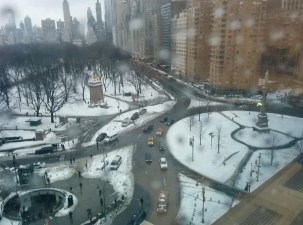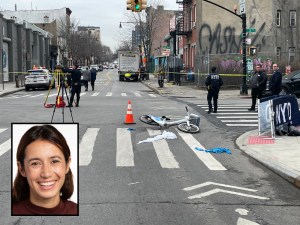Who Supports the Prospect Park West Bike Lane?

As a referendum on the Prospect Park West redesign, last night’s Community Board 6 hearing was another clear signal that the two-way, protected bike path enjoys broad support within the community. On the community board’s sign-in sheet, 86 people put their names down to testify in favor of the project while 11 signed up to speak against it. Transportation Alternatives handed out stickers to 330 supporters before their supply ran out.
Like the last CB 6 meeting on the project, Council Member Brad Lander got one of the most enthusiastic receptions from the crowd. Lander’s mid-speech declaration — “I believe the Prospect Park West bike lane is working” — received a loud burst of applause. (For those wondering where Council Member Steve Levin was last night, all I can tell you is that he wasn’t at the hearing.)
While time ran out on the hearing before many people who wanted to speak in favor of the redesign got their turns at the mic, stories about the positive impact of the bike lane were not in short supply. Here are three highlights from more than two dozen spoken testimonials:
- Elizabeth Elkind identified herself as a disabled pedestrian, a cyclist, and mother. An old injury makes it difficult and time-consuming for her to walk long distances, and the new bike lane lets her ride to Prospect Park and Celebrate Brooklyn without feeling like she’s risking her life.
- “I like to pick up my kids from Hebrew school on my tandem,” said Prospect Park West resident Gary Eckstein. “Before it wasn’t safe, but now I can do it.”
- Jesse Rosenfeld came out as “a registered Republican living in Park Slope” and a two-time George W. Bush voter. “Even I support the bike lane on Prospect Park West,” he said. “I want more bicyclists in NYC, because I am pro-health. I want more families riding bikes, because I am pro-family. I want more delivery cyclists, because I am pro-business.” He concluded with an exhortation to cyclists to “please police yourselves better.”
As a forum for gathering ideas about how to improve the current configuration, the hearing produced a fair amount of testimony that bolstered the DOT’s proposal to improve pedestrian crossings by turning the flush pedestrian areas between the traffic lanes and the bike lane into raised concrete pedestrian refuges, which would effectively prevent cars from parking in them and interfering with sightlines. Getting a clear view of bike traffic as you cross the street to reach the park was mentioned a few times as a concern. If the pedestrian areas remain clear of parked cars, this is not a problem:

Some especially trenchant observations came from Doreen Martinez, who didn’t sign up as a supporter or a detractor, but opted for the “other” category. She came without attachments, but she had opinions and analysis to spare.
Redesign opponents had been handing out flyers making the case for their lawsuit against the city. A core claim of theirs is that DOT shouldn’t have used multi-year averages to measure the rate of injuries on PPW before the redesign, even though that’s how the feds do it [PDF], that’s how DOT has done it for other projects [PDF], and that’s what good statistical methodology demands. After reviewing the handout, Martinez sliced through the opponents’ argument. “Frankly, that’s statistically insignificant,” she said, “but I do hear ‘danger.’ If danger is a concern, why not enforce crosswalks.”
Martinez compared the bike lane to a recent change at the bank where she works. Two years ago the bank installed turnstiles to better control who came in to the branch. People were up in arms because they weren’t used to the change and were spilling coffee on themselves. Then they got used to it. “Of course there’s going to be an adjustment period,” she said about the PPW redesign. “I say find better methods to improve what we’ve already got.”
The groups suing the city want to erase what we’ve already got, and replace the two-way protected lane with one-way, unprotected bike lanes on Eighth and PPW, adding a third traffic lane back to PPW as well. Louise Hainline, president of “Neighbors for Better Bike Lanes,” branded this proposal a compromise, but it would negate the principal benefits that the protected bike lane has produced, inviting a return to rampant speeding on Prospect Park West. It would also signal the end of safe, all-ages cycling on PPW, forcing cyclists to ride next to fast-moving traffic and constantly swerve around double-parked cars.
Hainline offered this deal: Accede to NBBL’s demands, and they’ll withdraw the lawsuit. “This is going to get enormously tiring,” she said. “You’re going to get tired, we’re going to get tired.”
I’m not so sure. At the end of the evening, after hours spent in an overheated auditorium, hundreds of bike lane supporters filtered out of John Jay High School looking, to my eyes, rejuvenated.


